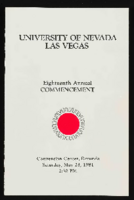Search the Special Collections and Archives Portal
Search Results

University of Nevada, Las Vegas (UNLV) 18th commencement program
Date
Archival Collection
Description
Commencement program from University of Nevada, Las Vegas Commencement Programs and Graduation Lists (UA-00115).
Text
Raymond Germain Professional Papers
Identifier
Abstract
The Raymond Germain Professional Papers (approximately 1960 to 1970) contain material and photographs related to California Post Offices.
Archival Collection
Roger D. Foley Papers on United States v. Cappaert
Identifier
Abstract
The Roger D. Foley Papers on United States v. Cappaert are comprised of materials collected by District Judge Roger D. Foley while performing his duties as judge in
Archival Collection
Kane Springs Ranch Records
Identifier
Abstract
The Kane Springs Ranch Records (1930-2005) contain materials related to the Kane Springs Ranch in Meadow Valley Wash outside of Moapa, Nevada. The collection primarily focuses on the property itself, but also contains a genealogy of the Huntsman family, the ranch's first owners. Records include deeds and materials from the sale of the Kane Springs Ranch to the Bureau of Land Management in 2005. The bulk of the collection documents how the Bradley Stuart family used its resources from 1952 to 2003. These materials are related to water usage on the property and a rock and sand mining operation.
Archival Collection
John Ponticello Papers
Identifier
Abstract
The John Ponticello Papers are comprised of materials related to Ponticello's experiences in Las Vegas, Nevada between 1956 and 1971 with an emphasis on his Research Gambling Game Project, which he conducted and published between 1968 and 1971. The collection includes materials regarding gaming licenses and applications, research agreements, descriptions of the project, and publications about the research project. Also included are materials from Ponticello's experiences in Las Vegas such as business cards, county work cards, and souvenir photographs.
Archival Collection
Celesta Lowe oral history interview
Identifier
Abstract
Oral history interview with Celesta Lowe conducted by Patrick W. Canlton on February 06, 2002 for the Boyer Early Las Vegas Oral History Project. Lowe begins by discussing her early life in Baker, California and her father’s role as a station agent for the Tonopah Tidewater Railroad during the 1920s and 1930s. Lowe then describes her family moving to Las Vegas, Nevada in the 1940s. Lowe chronicles the process state legislatures took to open Nevada Southern University in 1957 and her role as an administrative assistant in the main office of the school. Lowe recounts her career at Nevada Southern University, the expansion of the campus, and renaming it University of Nevada, Las Vegas. Lastly, Lowe talks about her switch from an administrative assistant to a librarian at UNLV.
Archival Collection
Larry Ruvo oral history interview
Identifier
Abstract
Oral history interview with Larry Ruvo conducted by David G. Schwartz on January 27, 2009 for the Remembering Jay Sarno Oral History Project. Ruvo begins by discussing his position as a front desk clerk at Caesar’s Palace in Las Vegas, Nevada in the 1970s. Ruvo then describes how Jay Sarno changed the casino industry by designing Caesar’s Palace with a single theme. Ruvo then chronicles how gaming gradually was legalized in more areas throughout the world and how Sarno capitalized on making Caesar’s Palace an iconic casino which made people want to travel to Las Vegas. Lastly, Ruvo discusses Sarno’s focus on offering both gaming and entertainment options for guests at Caesar's Palace.
Archival Collection
Raymond Germain Photograph Collection
Identifier
Abstract
The Raymond Germain Photograph Collection (approximately 1960-1970) consists of two black-and-white photographic prints of Raymond Germain and one black-and-white photographic print of his wife, Mary Germain. All of the photographs have corresponding negatives.
Archival Collection

Kathia Quiros Pereira oral history interview: transcript
Date
Archival Collection
Description
Oral history interview with Kathia Quiros Pereira conducted by Monserrath Hernández on March 6, 2020 for the Latinx Voices of Southern Nevada Oral History Project. Pereira discusses her personal history and immigration from Lima, Peru to the United States. She also talks of her educational background as a student at the William S. Boyd School of Law at the University of Nevada, Las Vegas and her current work as a founding partner of Pereira Immigration Law Group where she exclusively practices immigration law in Las Vegas.
Text

Mariteresa Rivera-Rogers oral history interview: transcript
Date
Archival Collection
Description
Oral history interview with Mariteresa Rivera-Rogers conducted by Maribel Estrada Calderón on October 24, 2018 for the Latinx Voices of Southern Nevada Oral History Project. In this interview, Mariteresa discusses her early life in Concepción, Chile. She talks about her experience moving to Las Vegas, Nevada in 1965, the immigration process at the time, and becoming a Spanish language court interpreter. Rivera-Rogers recalls enrolling at the University of Nevada, Las Vegas' (UNLV) Sam Boyd School of Law, and her involvement with the Latino Bar Association. Lastly, Rivera-Rodgers discusses the challenges in translating Spanish language to English.
Text
